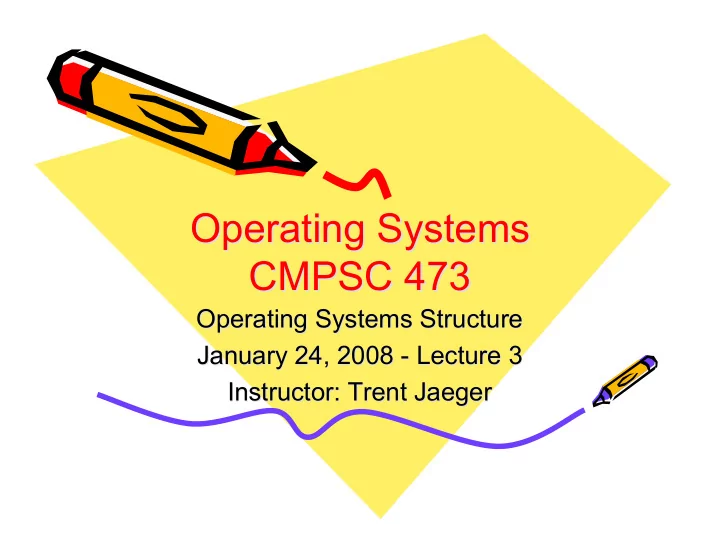

Operating Systems Operating Systems CMPSC 473 CMPSC 473 Operating Systems Structure Operating Systems Structure January 24, 2008 - Lecture January 24, 2008 - Lecture 3 3 Instructor: Trent Jaeger Instructor: Trent Jaeger
• Last class: – Computer architecture support for systems • Today: – Operating Systems Structures and Basics
Interlude • Recap of OS goals – Resource management • Memory, Devices – Scheduling – Security – Services to programs/applications
Functionality Expected from a Modern OS
Libertarian View • Everyone should get to do whatever they want – As long as they let others live • Processes should feel they have the entire computer – Infinite CPU, RAM, … – No threat of someone harming them
Socialistic View • To each according to his needs – Co-operative existence enforced by govt/OS – Fair allocation of resources
OS as a Communist Govt. • Centralized control and monitoring • Allocate resources efficiently • Misbehavior => Termination
Theory vs. Practice • Performance – Efficient and fair resource allocation, illusion of unlimited resources • Isolation – Protect everyone from each other and from the OS • How to do this efficiently? – Hardware support
Operating System Approaches • Monolithic – Everything in one program – Lacks structure • Kernel – Core services • Management of Abstractions • Microkernel – Core concepts • Fundamental objects; Management in servers • Exokernel – No abstractions; interface to hardware
Monolithic OS • Management in kernel
Microkernel OS • All management is outside kernel – Servers
Monolithic Systems
Operating System Layers
System Layers • Application • Libraries (in application process) • System Services • OS API • Operating system kernel • Hardware
Applications to Libraries • Application Programming Interface – Library functions (e.g., libc) • Examples – printf of stdio.h • All within the process’s address space – Static and Dynamic linking
Applications to Services • Maintain the system software configuration – E.g., cron • Provide syntactic sugar for using resources – E.g., printing, network, files, etc. • UNIX man pages, sections 1 and 8
Libraries to System • System call interface – UNIX man pages, section 2 – Examples • open, read, write, unistd.h • Special files – Drivers, /proc, sysfs
System to Hardware • Software-hardware interface • OS kernel functions – Concepts == Managers -- Hardware – Files == drivers -- devices – Address space == virtual memory -- memory – Instruction Set == process model -- CPU • OS provides abstractions of devices and hardware objects (files)
System Call Overview
System Call Handling
System Call Handling • Procedure call in user process • Initial work in user mode (libc) • Trap instruction to invoke kernel (int 0x80) • Preparation (e.g., sys_read, mmap2) • I/O command (read from disk) • Wait (disk is slow) • Completion (interrupt handling) • Return-from-interrupt instruction • Final work in user mode (libc) • Ordinary return instruction
Resource Manager • OS is a resource manager – Devices, Time, Space, Power, etc. • OS provides abstractions for resources – Files, sockets, etc. • Resource allocation • Resource management
Two Processes and an OS • Access to persistent data – File on a disk • Allocation – Each allocates an abstract resource (file) – E.g., OS allocates physical resource on disk • Management – Processes may access own files – E.g., OS protects access to disk via protecting access to file abstraction
Two Processes and an OS • OS competes with the processes for resources – E.g., OS uses disk to swap • Allocation – Kernel maps memory to disk – How does the kernel know disk blocks to use? • Management – System memory is managed in cache, virtually, physically, on disk, … – Kernel must keep all of these straight
Summary • Operating systems must balance many needs – Impression that each process has individual use of system – Comprehensive management of system resources • Operating system structures try to make use of system resources straightforward – Libraries – System services – System calls and other interfaces • Resources are allocated and managed by kernel – May require mapping between different representations
• Next time: Processes
Recommend
More recommend